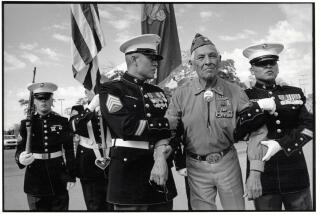Michael Jacoby’s Memories of Iwo Jima Anniversary
- Share via
Dear President Reagan,
I want to share a personal experience with you because of its impact on my life.
I heard my grandfather speak about the horrors of war, I saw his pictures and read of Iwo Jima, but on Feb. 19, 1985, it all became real to me because I went with him back to that battlefield.
An American transport plane took us from Tokyo to the tiny volcanic island. No one spoke as we were transported to the location where the Japanese-American “ceremony of peace” took place. Japanese were seated on one side of a large memorial, Americans on the other. Words were spoken in both languages, Buddhist priests carried incense, American clergymen spoke and bands played the national anthems. An American general even read a statement that you had written for the occasion.
But, President Reagan, I really think you should have been there to see what happened next. Japanese and American women, wives and daughters of the veterans, started embracing and exchanging mementoes--scarves, jewelry, anything--to let each other know how they felt. Men approached each other, at first shaking hands hesitantly, then embracing and crying. Some brought war souvenirs to return to their one-time enemies.
I didn’t realize someone had approached me until I felt a hat being placed on my head. A Japanese veteran smiled and introduced himself. His military hat was his gift to me. My grandfather approached and they talked and seemed glad that I cared enough to share this experience with them.
I don’t know what they said because I was touched by the moment. Thoughts raced through my mind.
These two old men were standing on top of Mt. Suribachi, hugging each other. Forty years ago they had been mortal enemies. Forty years ago they had tried to kill each other. Forty years ago the very spot where we stood had been alive with bombs, guns, flame-throwers and death and hatred. How could so much have changed in only 40 years? How many enemies have stood together as friends after murderous attacks on each other?
I felt as if I knew something no one else knew. It seemed to me that we should allow these men to show the rest of the world how bitter enemies can become friends and allies. They could get together as ambassadors of peace, American and Japanese, to speak to the people of the world. They could stand, arm in arm, and speak of the horrors of war and how they had once tried to kill each other.
I love my country very much and if you ask me to defend it, I will go. But I might find it hard to kill my enemy knowing that my own grandson may someday embrace him in friendship.
I took a lot of pictures that day and tried to remember faces. I even used a video camera. An article in the Wall Street Journal said, “A young American boy videotaped his grandfather’s reactions with a Japanese camera.” I guess he found irony in that, but the journalist missed the point. It was really my own reactions I was recording. I was determined to remember the feelings I was having because I was the youngest on the island that day and I was going to be able to remember the longest.
I feel it is my duty to share what I learned on Iwo Jima with as many people as possible. And, President Reagan, I can’t think of anyone more important to start with than you.
MICHAEL JACOBY
More to Read
Sign up for Essential California
The most important California stories and recommendations in your inbox every morning.
You may occasionally receive promotional content from the Los Angeles Times.










